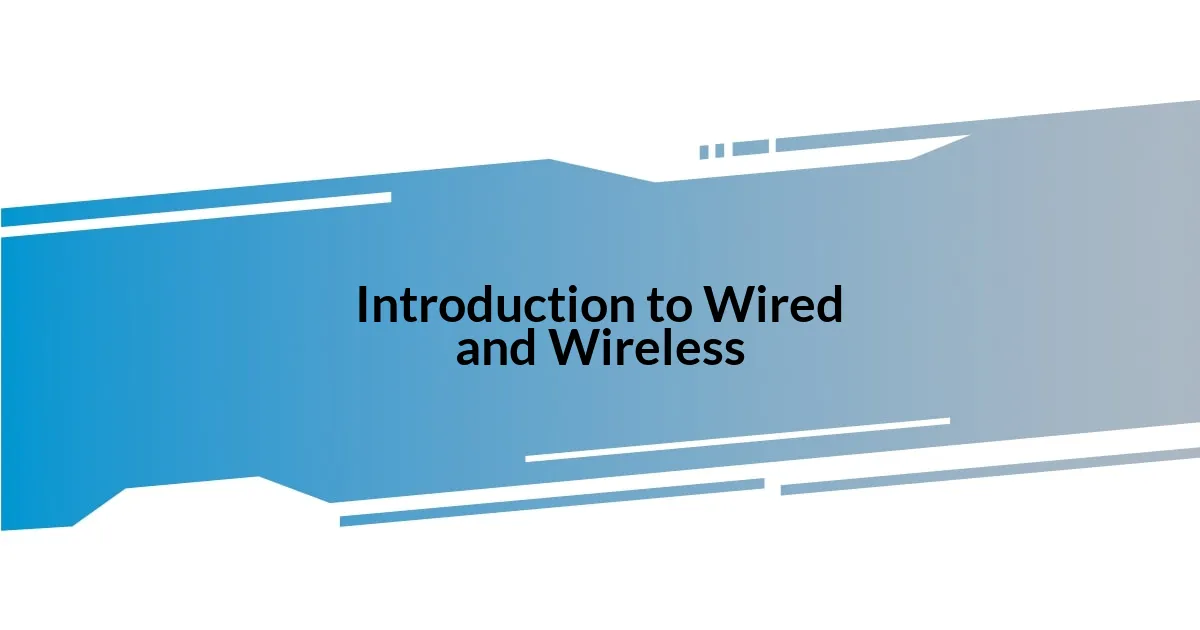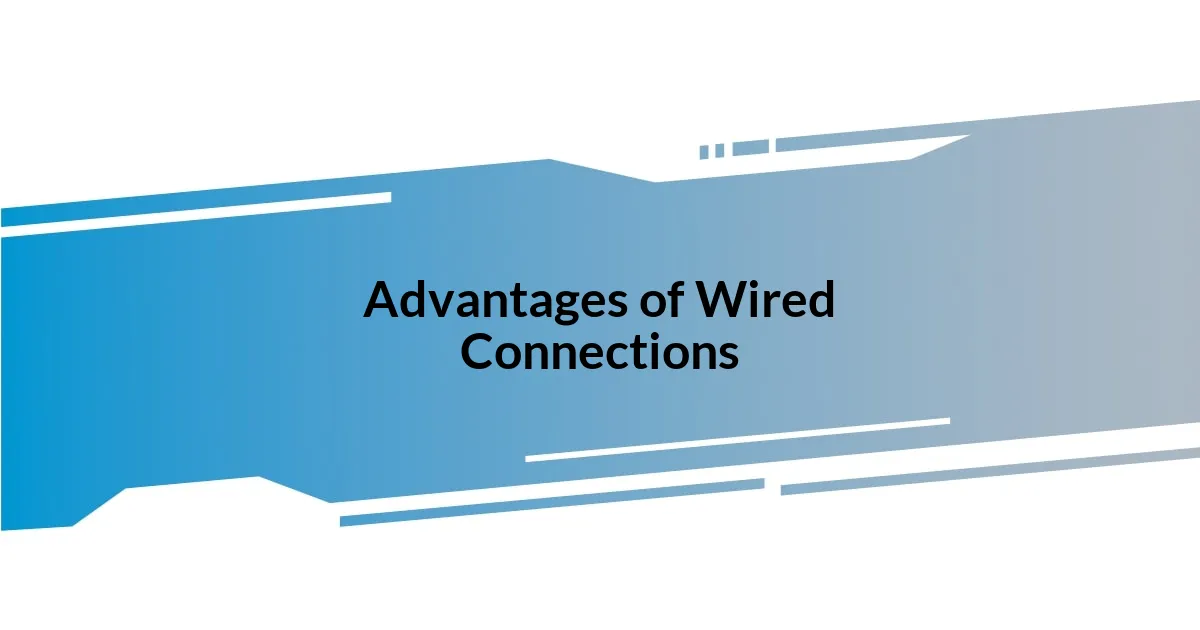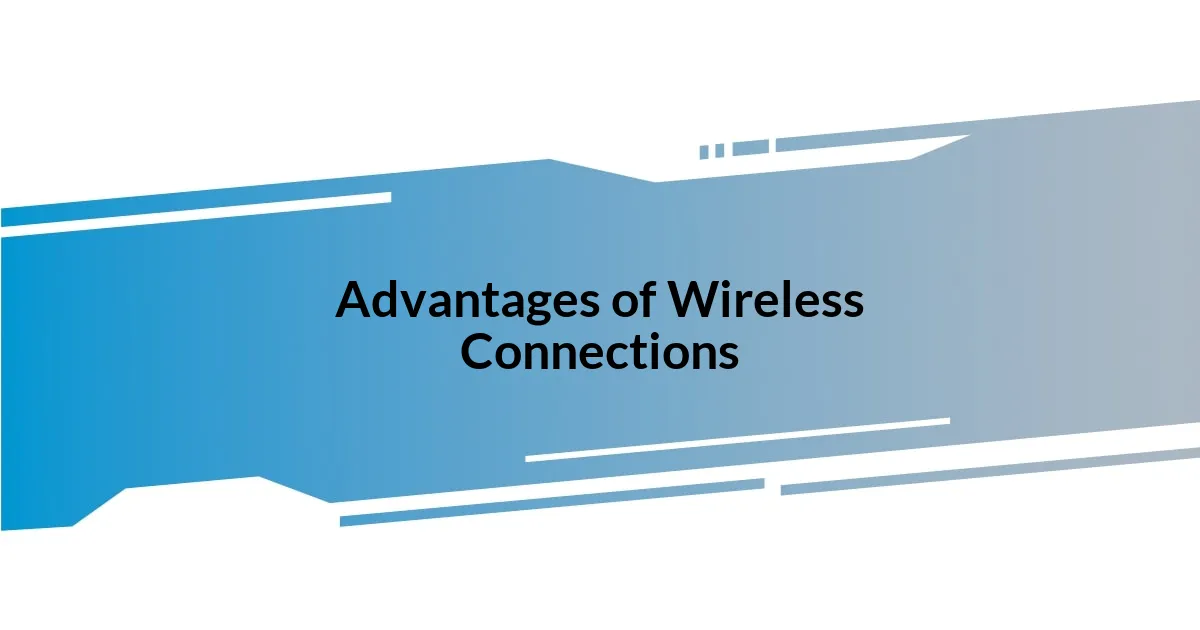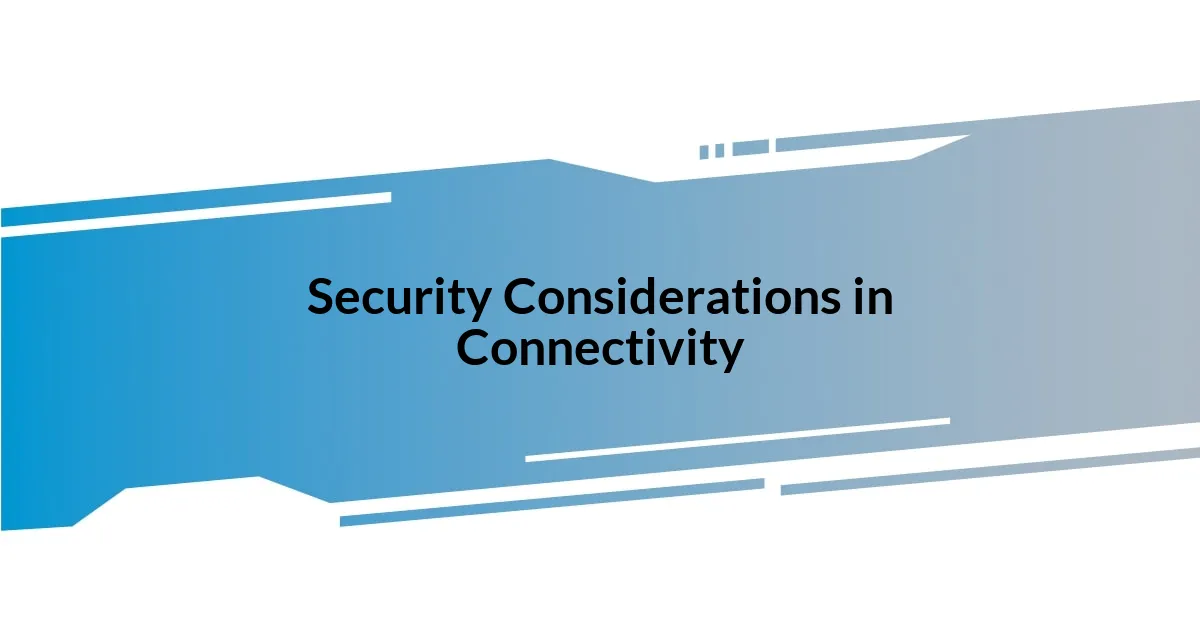Key takeaways:
- Wired connections offer superior reliability, speed, and security, making them ideal for high-demand tasks like gaming and video calls.
- Wireless connections provide unparalleled mobility and convenience, allowing users to connect easily across multiple devices.
- Speed and latency are significantly improved with wired connections, resulting in smoother online experiences and uninterrupted streaming.
- Security concerns with wireless networks highlight the importance of encryption and protective measures like VPNs for sensitive data transmission.

Introduction to Wired and Wireless
When I think about wired and wireless connections, I can’t help but recall my first experience with a clunky modem back in the day. That loud dial-up sound felt like a rite of passage, didn’t it? It’s funny how far we’ve come; this transformation highlights the dynamic nature of technology and our evolving needs.
Wireless connections, with their ease and convenience, have become increasingly appealing in our fast-paced world. I often find myself wondering how I ever managed without the freedom to move around while staying connected. Remember when you had to sit next to the phone jack just to get online? The liberation that wireless internet brings feels nothing short of miraculous.
Yet, there are still moments when I appreciate the stability of wired connections. For instance, during critical online meetings or gaming sessions, I rely on that solid, uninterrupted connection. Isn’t it comforting to know that, during those moments, I can trust in the reliability of a good old-fashioned cable?

Advantages of Wired Connections
Wired connections boast a remarkable reliability that often transcends their wireless counterparts. I’ve noticed that during intense work sessions or gaming marathons, my wired connection provides a level of stability that just can’t be beaten. When I take a moment to look back at how many times I’ve faced connectivity issues mid-game, I find myself gratefully acknowledging that consistent performance a cable can deliver.
Another advantage of wired connections is their superior speed, especially for tasks that demand high bandwidth. I distinctly remember downloading large files for a project just yesterday—it was over before I could even grab my coffee. That moment reinforced my belief in how a wired setup often offers a faster transfer rate, reducing pesky lag times that tend to crop up with wireless connections.
Security is another critical factor I appreciate with wired networks. As a regular user of online services, I’ve come to value the reduced risk of malicious attacks associated with hardwired setups. When I think about how vulnerable wireless signals can be, I feel a sense of comfort knowing that my wired connection shields my data from potential intruders, allowing me to surf confidently.
| Advantages | Description |
|---|---|
| Reliability | Offers a stable connection, especially during high-demand tasks. |
| Speed | Typically faster transfer rates, reducing lag during downloads and streaming. |
| Security | Lower risk of data breaches since wired connections are not susceptible to wireless interception. |

Advantages of Wireless Connections
Wireless connections bring a level of freedom and flexibility that wired connections can hardly match. I remember the first time I used Wi-Fi at a coffee shop; it felt like stepping into the future. I could sit anywhere, sipping my favorite brew, and still be connected to my work. That ability to move around freely, whether I’m at home or in a bustling café, is something I genuinely cherish.
Here’s a quick rundown of the advantages that wireless connections offer:
- Mobility: Move around without being tethered to a cable, making it easy to stay connected while on the go.
- Easy Setup: Typically requires minimal installation, allowing you to get up and running in no time.
- Multiple Devices: Connect numerous devices at once, creating a seamless online experience for everyone in the household.
For me, the convenience of being able to work from my living room while lounging on the couch is unbeatable. It’s that blend of comfort and connectivity that gets me energized to tackle my to-do list.

Comparing Speed and Latency
When it comes to speed, I’ve found that wired connections consistently outperform wireless options. I remember the frustration of trying to stream a movie on a wireless network, only to have it buffer during critical moments. Going wired has changed that experience completely; now, I can stream without interruption, and the crystal-clear visuals are worth every inch of cable.
Latency is another critical factor where I’ve noticed a stark difference. During online gaming, a few milliseconds can mean the difference between victory and defeat. I can still recall the adrenaline rush when I improved my gameplay simply by switching to a wired connection—suddenly, my reactions felt instantaneous, and I couldn’t help but feel a sense of accomplishment.
It’s fascinating how our needs dictate our preferences, isn’t it? For those who rely on video calls for work or study, latency can be a real party crasher. I’ve been on calls where wireless latency turned my perfectly timed joke into an awkward silence. Switching to a wired setup has made my conversations smoother, allowing me to reconnect with colleagues without those annoying delays that once plagued my discussions.

Security Considerations in Connectivity
Security is a vital aspect of connectivity that shouldn’t be overlooked. I remember the uneasy feeling I had when my neighbor mentioned a recent Wi-Fi hack in our neighborhood. It was a wake-up call about just how vulnerable wireless connections can be. With data being transmitted over the air, it’s crucial to ensure strong encryption, such as WPA3, is in place to help safeguard that information from prying eyes.
On the other hand, wired connections often provide a level of security that’s inherently more robust simply due to their physical nature. I have a friend who runs a small business, and he made the wise choice to install wired networks throughout his office. Knowing that his sensitive data is not floating around in the ether, but rather confined to cables, gives him peace of mind. A solid firewall and regular updates are still necessary, but that additional layer of security certainly puts him at ease.
Even though wireless technology continues to evolve with advanced security protocols, I still find myself pausing before sending sensitive information over Wi-Fi. Have you ever felt that hesitation? I do think about the balance between convenience and security, and that’s why having a VPN (Virtual Private Network) is often a good idea for those who frequently use public networks. It adds just the right layer of protection, enabling me to roam freely while keeping my data safe.